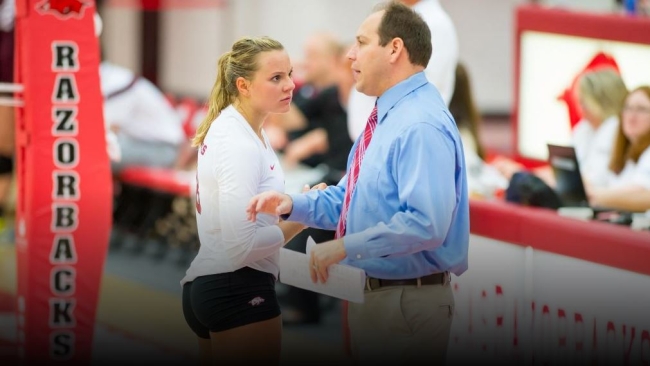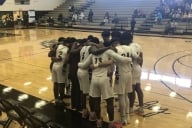You have /5 articles left.
Sign up for a free account or log in.

Robert Pulliza, former head women's volleyball coach at the University of Arkansas
University of Arkansas
The head coach of the University of Arkansas women’s volleyball team resigned Wednesday after a letter sent to the university’s athletic department accused the coach of verbally abusing and threatening his players. The letter -- signed only by “extremely concerned Razorback parents” -- called the coach “sadistic and a danger to young minds.”
According to the letter, Robert Pulliza, the head coach, allegedly told one player that she was lucky he didn’t “punch [her] out of the gym,” and he allegedly threatened to keep players from participating in games he knew their families had traveled long distances to watch. The authors of the letter claim that Pulliza frequently referred to his players as “weak bitches” and used other insults.
In a statement released before his resignation, Pulliza denied the allegations and said that coaching a college team sometimes requires “tough, but fair, love.”
“These last few weeks have been some of the most difficult that I have experienced in my life, both personally and professionally as a coach,” Pulliza said. “Any accusation that I have threatened physical harm to any player or called players names like the demeaning terms that have been alleged is simply false. Many of the allegations made against me speak more to a style of coaching that might not be for everyone, but is not uncommon in college athletics.”
College coaches have long been known for taking a stance of “tough love” or for “riding” their players, particularly in sports like football and men's basketball. But that style of coaching hasn’t gone without criticism, and in recent years several coaches have been sanctioned or fired for crossing the line into abuse.
In August, the University of Illinois at Urbana-Champaign fired its head football coach after a review into the coach’s behavior revealed that he put his players at risk by deterring them from reporting injuries and pressuring them -- through insults and embarrassment -- to continue playing when hurt.
The Illinois coach’s dismissal came three months after a former player posted a series of messages on Twitter, alleging that the coach and his staff frequently berated injured players, threatening to take away their scholarships if they did not return to practice quickly after an injury. The staff called hurt players derogatory names and dressed them in a rival team's colors during practices in an attempt to shame them, the former player said.
In 2013, Rutgers University dismissed its athletic director, Tim Pernetti, and its men’s basketball coach, Mike Rice, after a video surfaced showing Rice tossing homophobic slurs and basketballs at players. Pernetti’s replacement, Julie Hermann, was then accused of verbally abusing players during her time as a women’s volleyball coach at the University of Tennessee. Former players Hermann coached there told The Star-Ledger of Newark that she called the athletes “whores, alcoholics and learning disabled.”
The allegations against Pulliza, who became the Arkansas volleyball coach in 2008, are similar. The anonymous letter accuses the head coach of chastising and embarrassing players who are injured. If other players attempted to defend or comfort the athlete being abused, the letter states, Pulliza would prevent them from practicing or begin berating them as well.
“We understand as parents of athletes that coaches sometimes are passionate about their sport,” the letter reads. “Sometimes they yell. Sometimes they say things a little out of the ordinary. Sometimes they may curse. But this man terrorizes our daughters.”
The letter also claims that some players had reported the behavior to the athletic department, but administrators never took any action. If the allegations are true, then the coach’s conduct and the university’s lack of response could be a violation of Title IX of the Education Amendments of 1972, the gender discrimination law, Erin Buzuvis, director of the Center for Gender and Sexuality Studies at Western New England University, said.
“Regardless of the gender of the coach, the case could raise the possibility of Title IX liability if the slurs and threats constitute sexual harassment and if university officials knew about the harassment and were deliberately indifferent in their response,” Buzuvis said. “For slurs and threats to be sexual harassment, they would have to be gendered or sexual in nature and also be considered severe and pervasive.”
In a statement last week, the University of Arkansas said it had “initiated an inquiry into the allegations,” but noted that “an anonymous letter does not provide an opportunity to authenticate the legitimacy of the author(s) of the letter or its content.” Since the letter was received, however, several players have come forward to agree with the claims, many of which were gender related.
Current and former volleyball players told the university’s student newspaper, the Traveler, that Pulliza called them “weak bitches,” “pouty bitches” and “pussies.”
One former player, Summer Morgan, said she transferred to another institution after three years on the team because of Pulliza’s behavior. “It got to the point where I was isolated from the team and treated like an outcast,” Morgan said. “I just really couldn’t take it anymore. It took the passion for volleyball away from me for a while, and I’ve never experienced anything like that from a coach before.”
In a statement Wednesday about Pulliza’s resignation, the university did not mention the allegations against the coach, instead focusing on the coach’s record. In November, the team ended the season with a four-game losing streak.
“I have accepted Coach Pulliza’s resignation and we wish him the best in his future coaching career,” Jeff Long, the university’s director of athletics, said. “I believe we have the components for building a strong volleyball program while competing for Southeastern Conference championships and consistently competing in the NCAA tournament.”








